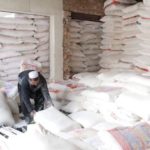US researchers gave the first shots in a first test of an experimental coronavirus vaccine Monday, leading off a worldwide hunt for protection even as the pandemic surges.
With careful jabs in the arms of four healthy volunteers, scientists at the Kaiser Permanente Washington Research Institute in Seattle began an anxiously awaited first-stage study of a potential COVID-19 vaccine developed in record time after the new virus exploded out of China and fanned out across the globe.
“We’re team coronavirus now,” Kaiser Permanente study leader Dr. Lisa Jackson said on the eve of the experiment. “Everyone wants to do what they can in this emergency.”
The Associated Press observed as the study’s first participant, an operations manager at a small tech company, received the injection in an exam room.
“We all feel so helpless. This is an amazing opportunity for me to do something,” Jennifer Haller, 43, of Seattle said before getting vaccinated. Her two teenagers “think it’s cool” that she’s taking part in the study.
After the injection, she left the exam room with a big smile: “I’m feeling great.”
Three others were next in line for a test that will ultimately give 45 volunteers two doses, a month apart.
Neal Browning, 46, of Bothell, Washington, is a Microsoft network engineer who says his young daughters are proud he volunteered.
“Every parent wants their children to look up to them,” he said. But he’s told them not to brag to their friends. “It’s other people, too. It’s not just Dad out there.”
Monday’s milestone marked just the beginning of a series of studies in people needed to prove whether the shots are safe and could work. Even if the research goes well, a vaccine would not be available for widespread use for 12 to 18 months, said Dr. Anthony Fauci of the U.S. National Institutes of Health.
At a news conference, President Donald Trump praised how quickly the research had progressed. Fauci noted that 65 days have passed since Chinese scientists shared the virus’ genetic sequence. He said he believed that was a record for developing a vaccine to test.
This vaccine candidate, code-named mRNA-1273, was developed by the NIH and Massachusetts-based biotechnology company Moderna Inc. There’s no chance participants could get infected because the shots do not contain the coronavirus itself.
It’s not the only potential vaccine in the pipeline. Dozens of research groups around the world are racing to create a vaccine against COVID-19. Another candidate, made by Inovio Pharmaceuticals, is expected to begin its own safety study next month in the U.S., China and South Korea.
The Seattle experiment got underway days after the World Health Organization declared the new virus outbreak a pandemic because of its rapid global spread, which has infected more than 169,000 people and killed more than 6,500.
COVID-19 has upended the world’s social and economic fabric since China first identified the virus in January, with broad regions shuttering schools and businesses, restricting travel, canceling entertainment and sporting events, and encouraging people to stay away from each other.













